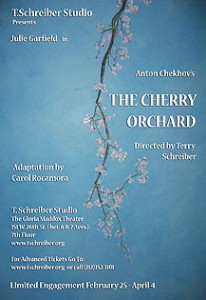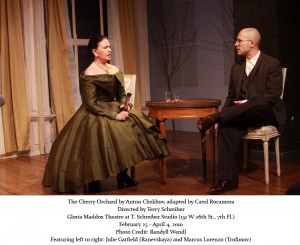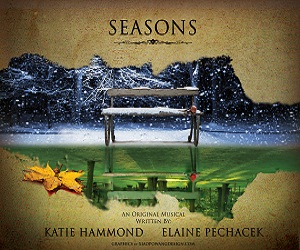
The Cherry Orchard was written in 1904 by Anton Chekhov and while it was the writer’s intent to have it play as comedy, the original production was directed as a tragedy. This latest production of the play, directed by the venerable Terry Schreiber, contains elements of both comedy as well as tragedy, but it ultimately plays as a tale of transformation and renewal.
In Carol Rocamora’s new adaptation, playing at the T. Schreiber Studio, the story of The Cherry Orchard hardly seems dated at all, and this family, that we are given an intimate insight into, runs much like any that has recently fallen upon difficult times. We come upon the story as Madame Ranevskaya (Julie Garfield) is about to return to her estate in Russia after a five-year-long absence spent in Paris. She had fled quickly, after the tragic drowning of her young son (which came upon the heels of the death of her husband) and had left the responsibilities of running the estate on the shoulders of her capable eldest daughter, Varya (Aleksandra Stattin). Over these last years Varya had done what she could to keep the household running, despite the fact that money is tight and interst on their outstanding loans continues to bear down on them.
Accompanying Madame Ranevskaya upon her return is her younger daughter, Anya (Laine Bonstein) who had gone for a visit to Paris and is now bringing her mother back home to Russia for good. Family, friends, and servants alike eagerly await their return, but a lot has changed in the time the Mistress of the Manor has been gone.
Most notably Lopahkin (Jamie Kirmser), the son of a serf , has now become a wealthy landowner. Yet he still carries the stigma of his humble beginnings (Here I am . . . a pearl out of an oyster. I’m rich now, with lots of money, but just think about it and examine me, and you’ll find I’m still a peasant down to the marrow of my bones.). In possession of a keen businsess mind, and eager to help the woman who had always been so kind to him, Lopahkin advises the Madame that the debt she has returned to could easily be paid if she were to consider parceling off the land and leasing it. It would mean tearing down the beloved cherry orchard, as well as the house, but at least the land would stay in the family and the debt could be repaid. Later they could rebuild, if they wished. But Madam Ranevskaya refuses to listen to this idea, and instead dithers about, wasting precious time and rhapsodizes about her lovely orchard which seems to become a character in it’s own right and a member of the family.
Others in the family offer no concrete help either; a brother, Gaev (Rick Forstmann) is concerned, but equally bumbling when it comes to business matters. He talks in circles but can devise no reliable plan on how to save the land.
Hoping for a miracle, the family sends Gaev and Lopahkin off to an auction of the orchard, praying that Gaev’s small amount of money will be enough to save the land. They come back that evening with surprising results; it is Lopahkin – not Gaev – who bought the orchard at the auction. Madame finds that she is now forced to do exactly what Lopahkin had instructed all along – leave the cherry orchard and allow it to be razed in order to build anew. Only now, it is not even her land anymore.
Ultimately, the entire family seems to greet this news with a sense of inevitability and acceptance; that what they all feared most has now in fact happened, and while the news is shocking it is not exactly devastating, it seems rather to free them. Each character now has a new opportunity to go off and explore a path that hadn’t been available or desirable before while they were all tethered to this orchard which only provided an illusion of comfort and security. Truly, any comfort or security the land had was gone long ago, simply a memory of past greatness that no longer existed.
An old serf of the family, Firs (Peter Judd), acts within the play as a metaphor for the spirit of the orchard itself. Now an old man 0f 87 he is the only character in the play to remember the glory days when the cherry orchard produced fruit with a rewarding outcome:
LOPAKHIN: The only remarkable thing about the orchard is that it’s very large. It only bears fruit every other year, and even then you don’t know what to do with them; nobody buys any.[ . . .]
FIRS: In the old days, forty or fifty years back, they dried the cherries, soaked them and pickled them, and made jam of them, and it used to happen that . . .
GAEV: Be quiet, Fiers.
FIRS: And then we’d send the dried cherries off in carts to Moscow and Kharkov. And money! And the dried cherries were soft, juicy, sweet, and nicely scented. . . They knew the way. . . .
LUBOV: What was the way?
FIRS: They’ve forgotten. Nobody remembers.
To Firs the orchard was a vital part of what the estate was about, the cherry orchard made the land more than just a house, or even a home; but a place for producing wealth, a livelihood, a reason for continuing. Like the orchard, Firs is a remnant of another time, and he carries the last remaining memory, which even now, to his own self, grows dim. At the end of the play when he is inadvertently locked inside the house and is left alone with nothing but the sound of the orchard being chopped down, it is as if his whole purpose has been fulfilled and now his life can be over. He can rest.
This marvelous production of The Cherry Orchard directed by Terry Schreiber literally shimmers with layers of beauty; deep and nuanced performances are given amidst a beautiful large set designed by Hal Tine which is both minimalist and lush; Dawn Testa’s costumes add a quality of richness and remarkability; you can hear the fabrics rustle. The entire staging is so evocative and precise that it allows Chekov’s work to shine as it is held aloft and illuminated by this team of great talents.
 Julie Garfield as Madame Ranevskaya is mesmerizing. She can at once show you her strength as well as her weakness, and bring you along on her character’s journey. When she spoke of her cherry orchard, her emotions were so passionate that I followed her gaze, half expecting to see lush blossoming trees, even though I knew they weren’t there. Garfield shades Madame Ranevskaya’s love of this Russian land with a tinge of the love Scarlet O’Hara had for Tara; she brings to life this love that we, 100 years later, can hardly imagine; this love of the land, of an ancestral home that becomes as much a part of you as your own blood.
Julie Garfield as Madame Ranevskaya is mesmerizing. She can at once show you her strength as well as her weakness, and bring you along on her character’s journey. When she spoke of her cherry orchard, her emotions were so passionate that I followed her gaze, half expecting to see lush blossoming trees, even though I knew they weren’t there. Garfield shades Madame Ranevskaya’s love of this Russian land with a tinge of the love Scarlet O’Hara had for Tara; she brings to life this love that we, 100 years later, can hardly imagine; this love of the land, of an ancestral home that becomes as much a part of you as your own blood.
If you’ve been longing to see a fantastic classic brought to the stage by some of the most talented people working in the theatre today, then do not miss this production of The Cherry Orchard. It will be the production you will always remember as the standard by which all other Chekov productions are measured.
~~~
THE CHERRY ORCHARD The Cherry Orchard by Anton Chekhov adapted by Carol Rocamora Directed by Terry Schreiber The Gloria Maddox Theater at T. Schreiber Studio 151 West 26th St. (between 6th & 7th Ave.) February 25 – April 4, 2010 Thursday through Saturday at 8:00 pm & Sunday at 3:00 pm TICKETS: $25 – click here to purchase


{ 0 comments… add one now }
{ 1 trackback }